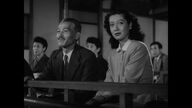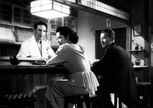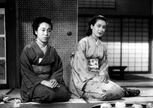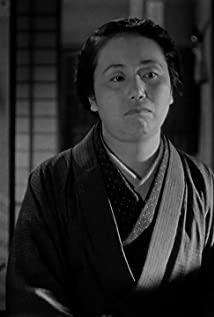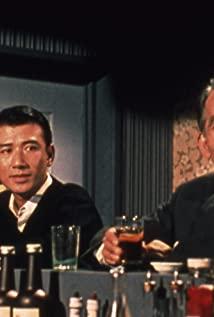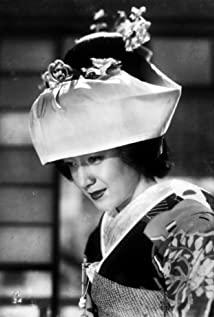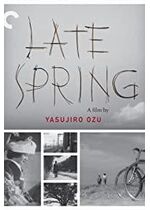-
Dee 2022-03-28 09:01:13
Score 1000 points for the Noh scene in "Du Ruo"... It's too shocking. The eternity of form and indoctrination symbolizes lightly on everyone's mind. Three or two sentences point out Noriko's irreversible post-war physical and mental trauma. Under her smiling face, there is perennial melancholy and an attempt to rebuild her inner order. The symbol of this order is her father. Her father's arrangement to marry her again deprived her of a legitimate reason not to break the peace and order, so she...
-
Oscar 2022-03-28 09:01:13
The same theme as the saury, less the sadness of late autumn, a stack of magazines slipping down from the books, the emotional ups and downs expressed in this way are quite oriental and subtle, and Ozu's films can always be seen with peace of mind, plain but not dull. (In addition, the heroine looks very strange when she laughs, she is not smiling but not...
-
Michele 2022-03-28 09:01:13
For Yasujiro Ozu, it seems that a stone is worth staring at for a long time. The thinking about objects and people runs through the film, and each of his usual fixed shots is as peaceful and beautiful as artistic photography. It shields one from all disturbances and agitation, and gives one a natural stretch of the whole body, as if drenched in a mixture of happiness and sadness, and it seems that there is no better place to discuss happiness than in such a slight...
-
Jerel 2022-03-28 09:01:13
Ozu's films don't seem to need dramatic conflict, so they talk about it like this, and often the emotional accumulation reaches a peak at the end, which is deep and heavy. In fact, the Electra plot in the film, with several unexplained emotional expressions, felt a bit abrupt, so it also led to an outrageous interpretation. The photography of the film is very elegant, and Setsuko Hara's sunny smile will infect...
-
Vilma 2022-03-27 09:01:21
Under the social paradigm at that time, it must be "marrying a daughter", because only a daughter will be "separated" by "marrying out". Using the sword of the current dynasty to slash the former officials will bring about a deformed view of "praising and strengthening the patriarchy", thereby denying the "normal" at that time. The second-hand subtitles in the archives have almost become performance art, vividly showing how the connotation of the language is damaged step by step during the...
-
Francisca 2022-03-27 09:01:21
Noriko is a typical example of traditional oriental women. She is considerate of her father and does not marry. She thinks remarriage is indecent, and she takes the initiative to cut off her love when she gets engaged. Noriko's final marriage is a process of gradually breaking free from the shackles of her mind, which means the beginning of a new family and the disintegration of the old one. With a smile like flowers and hazy eyes with tears, Noriko has entered a new stage of life, and her...
-
Grayson 2022-03-27 09:01:21
"You must be happy." The more she said that, the more she and him (Noriko and her father) needed to suppress their own emotions. In a sense, the wedding and seeing off in the film were like Noriko said goodbye to her past as an adult ceremony, learning to suppress her own desires, or learning to give up and forbearance really means becoming an adult to be recognized by others and this society, just like the last one in the film. Mirror, the tide is hitting the beach one after another, and they...
-
Tania 2022-03-27 09:01:21
#chinafilmarchive# Yasujiro Ozu 02, although he did not agree with the concept of marriage conveyed by the film, he was still moved by the sincere and pure emotion in his father's remarks. Do not want to be easily defined as "Electra", to some extent I can understand her. Kasa Chijo is so good, since yesterday, Tokyo Story has been sighing with emotion, peeping into his heart with a small...
-
Wilburn 2022-03-27 09:01:21
1. Milestones in various senses: the joining of Noda Takao, the opening of Hara Setsuko, the beginning of the series of married women, the real establishment of the status of Master Ozu. 2. In fact, there is a hidden continuity in the theme of the film before and after the war with Ozu. It is both a variation of "While My Father Lives" (two admonitions for children who want to live with their fathers); and another expression of the reconciliation theme of "The Hen in the Wind": women...
-
Alta 2022-03-27 09:01:21
Maybe Ozu's best movie, but where did this kind of Japanese culture...
Late Spring Comments
-
Aya Kitagawa: What's there to think about? Go on, marry him. Good men are rare these days. Grab him.
Noriko Somiya: But I don't like it.
Aya Kitagawa: What?
Noriko Somiya: Arranged marriage.
Aya Kitagawa: Don't be picky. You'd never marry unless someone arranged it.
Noriko Somiya: But...
Aya Kitagawa: It's true, isn't it? If you found someone you liked, would you walk up and propose? You're not that bold. You'd just blush and squirm in your seat.
Noriko Somiya: That's true.
Aya Kitagawa: An arranged marriage suits someone like you.
-
Masa Taguchi: Maybe some detail is bothering her?
Shukichi Somiya: Like what?
Masa Taguchi: Like his - name.
Shukichi Somiya: Kumataro Satake?
Masa Taguchi: Kumataro - "Bear Boy."
Shukichi Somiya: What's wrong with it? It sounds tough. If anybody's old fashioned, it's you. That wouldn't bother her.
Masa Taguchi: But doesn't it make you think of hairy chests and things? That bothers young ladies more than you imagine. And what should I call him if they get married? "Kumataro" sounds like a mountain bandit, "Kuma-san" is used for common bumpkins, and "Kuma-chan" sounds like "baby bear."
Shukichi Somiya: Well, we have to call him something.
Masa Taguchi: That's the point. I think I'll call him "Ku-chan."
Shukichi Somiya: "Little Vacuum"?


